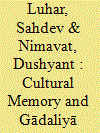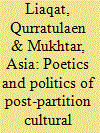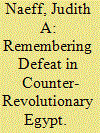|
|
|
Sort Order |
|
|
|
Items / Page
|
|
|
|
|
|
|
| Srl | Item |
| 1 |
ID:
172206


|
|
|
|
|
| Summary/Abstract |
Focused on the cultural memory of the Gādaliya Luhār community in Gujarat, this article discusses ways in which oral traditions and cultural memory among nomadic groups in India shape the identity of a community under the challenge of cultural amnesia. The Gādaliyā Luhārs claim Rājpūt status and close association with the kings of the Mewar region of Rajasthan, but experienced double cultural amnesia, first under the Mughals and later in the British Empire, which affected their identity. The article seeks to assess the authenticity of the community’s assertions of cultural memory in the light of some historical documents and asks to what extent cultural memory through oral narratives can be taken as valid evidence for understanding the cultural identity of a specific community.
|
|
|
|
|
|
|
|
|
|
|
|
|
|
|
|
| 2 |
ID:
133808


|
|
|
|
|
| Publication |
2014.
|
| Summary/Abstract |
Popular memory may be shaped by poetry, but it is in prose that some of the most compelling and innovative literary work about the First World War is to be found
For decades, Britain's cultural memory of the First World War has been dominated by poetry, the principal literary interpretation of the war taught in schools throughout the country. This poetry, argues Max Saunders, is often autobiographic and complements the memoirs that many writers penned in trying to express their experiences of the conflict - showing a complex and fluid relationship between autobiography and narrative. What is largely marginalised in British cultural memory is the novel; yet it is perhaps in this literary form, and in the work of Ford Madox Ford above all, that the most innovative interpretations of the conflict can be found
|
|
|
|
|
|
|
|
|
|
|
|
|
|
|
|
| 3 |
ID:
185090


|
|
|
|
|
| Summary/Abstract |
The term ‘cultural memory’ signifies a shared memory of a group of people inhabiting a common geographical location with a mutual understanding of religion, culture, and society. While fiction, non-fiction, and fine arts are used for archiving, reconfiguring, and reflecting on the communal memories that are historically, culturally, and politically significant, artefacts such as paintings and photographs are used to keep accurate historical records. This study argues that Kamila Shamsie’s novel Kartography (2002) is a literary rendition that fictionalises the most relevant collective memories of post-Partition Pakistan by providing a new perspective on resolving the political, ethnic and sectarian issues in a postcolonial community. The textual analysis of the novel, in association with cultural memory theoretical perspectives, reveals that it is a ‘mythistorical’ text that mythologises the history of Pakistan. The characters have been personified and condensed into ethno-racial stereotypes. The city of Karachi has been reconstructed into a literary chronotope, and human relationships have been used as metaphors to revisit the political mistakes of the past. Hence, this text is not only an artistic mimesis of post-Partition Pakistan’s ‘cultural memory’, but also a promulgation of a cultural change required for a more cohesive and peaceful South Asian regional politics.
|
|
|
|
|
|
|
|
|
|
|
|
|
|
|
|
| 4 |
ID:
191921


|
|
|
|
|
| Summary/Abstract |
This article analyses how a creative writing workshop in 2017 Cairo dynamically engaged with cultural memories of the 1967 defeat of the Arab armies. The article first situates 1967 as a crucial reference point in discursive attempts to tie personal life stories to national history and in making sense of a widespread feeling of postcolonial disenchantment. It is in the ruinous aftermath of the 2011 uprisings, when a view on a political horizon beyond the stifling present temporarily was reopened, that the workshop critically examined the relations between cultural memory, family history, and everyday life with, at its center, the notion of defeat in all its shapes and intensities. The article argues that the workshop can be seen as ‘an intimate public,’ carving out a space for survival lying largely outside of the sphere of politics. Nevertheless, in its affective plurality that stimulated modes of irreverence, the workshop tentatively opened up new political dispositions under the strenuous conditions of post-2013 Egypt.
|
|
|
|
|
|
|
|
|
|
|
|
|
|
|
|
|
|
|
|
|